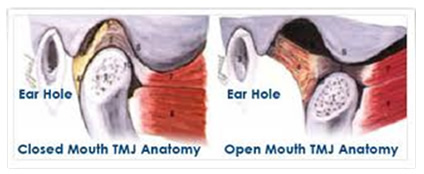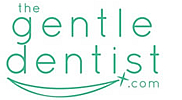
Shelby Township Dentist Discusses Jaw Pain, Clicking and Restricted Opening of the Mouth
We had a request recently from a patient to address the problems of jaw dysfunctions and more specifically on the reduction of one’s ability to open wide.
The jaw joint is called the TMJ (temporomandibular joint). This is a complex problem that has many aspects which must be considered. The human jaw joint is the most complex joint in the body and functions differently than any other joint in the body. Signs that patients can have are: Headaches, jaw clicking in front of the ear, pain in the jaw joint or head and/ or a limited opening of the mouth.
Anatomy: The jaw functions in a rotational motion similar to the way a door opens and closes on a hinge. The jaw is shaped like a modified ball and socket and works like any other joint in the body during the initial half of maximum opening. The lower jaw and disk are supported by muscles at the front and ligaments at the back. The sling that supports the jaw provides high mobility of the joint which gives the lower jaw (mandible) a large area of motion.
When opening to maximum the jaw comes forward and ideally the disk that is supported my muscles will come along with it for smooth opening. This is assuming that the muscles are functioning properly and the jaw joint is healthy.
The operative word is “healthy”. If the jaw joint make noise, there is limited opening or there is pain in the jaw joint then this usually means that there is a joint dysfunction. Joint dysfunctions are usually from either muscle tension or an internal anatomical problems.
Muscles: muscle tension usually comes from clenching and grinding of the teeth either in the day or at night. During the night this becomes a significant problem because there is no way that you can monitor the amount of pressure being placed. During sleep the amount of pressure on the teeth can be about 3-4 times more than during the day. This pressure creates tension in the muscles in the temporal area of the head and affects the functioning of the disk. This “sticky” movement of the disk will create a click in the jaw as the mouth is opened. The severity of the click can be reduced with treatment. If the click is from muscle tension I usually recommend using a a small bite guard that allows only the front teeth to touch. When wearing this at night the muscles relax allowing the disk to work properly and even reducing headaches.
Internal derangement of the Joint: If there has been irreversible damage in the joint complex then the disk can have what is termed anterior displacement. When the cartilage disk is displaced anteriorly symptoms will be experienced such as a grating noise when opening and closing and a reduction in the maximum amount of opening possible. In these cases there can be breakdown of the bone as they wear against each other.
It is very important to examine the patient to determine what the is the source of jaw pain. Accurate diagnosis requires the use of a cone beam CT scan to determine the status of the joint. If the space between the” ball and socket” is reduced then it probably indicates that the disk is permanantly out of position. Items such as full coverage bite guards are necessary to reduce the pain in the joint as bone rubs on bone.
Treatment for Jaw Pain
Treatment options are indicated and recommended based on the symptoms that the patient has and diagnosis we have made.
Jaw Pain Treatment Option One: Bite Splint Therapy
The first part of the treatment protocol could require the use of a bite splint. A full coverage splint is used that will cover the entire surface of either the upper or lower arch of teeth. This will help take some of the pressure off of the joint and reduce the destructive forces that take place during night grinding. We may recommend a guard that only covers the front teeth if the patient has headaches or a minor click. When covering only the front teeth with this removable appliance there is a reduction in the biting forces and a reduction of muscle activity. You can demonstrate this on your own: 1) Place a pencil in between your front teeth and clench. 2) Gently position your hands on the side of your face and notice the significant reduction in the muscle activity compared when you bite on your back teeth only. This principle is used to reduce headaches in a number of our patients by reducing the muscle activity to those areas where headaches are typically located.
Jaw Pain Treatment Option Two: Bite Adjustment (equilibration)
Clicking of the jaw can be treated once we know there is complete relaxation of the muscles that control the disk position. Once the musles are relaxed we can assess the bite and make sure the teeth are contacting properly. Ideally when the jaw is in the correct position you should bite on all of your teeth at the same time. If not, then a minor adjustment of the biting surfaces will be recommended to reduce the destructive forces that take place on the teeth. This will also help with the muscles that control the disk position.
Jaw Pain Treatment Option Three: Anterior Repositioning Splint
If there is destruction of the internal aspect of the joint then more advanced treatment becomes necessary. Only about 5% of the patients have this as a diagnosis and pain is the typical symptom they have. The other 95% can be successfully treated as described above. For those who have Internal breakdown of the joint a different type of bite splint called an anterior repositioning splint will be fabricated. This type of removable splint covers all of the teeth and forces the lower jaw forward when the teeth come together. This takes the pressure off of the bone to bone contact in the jaw with the hopes of reducing the pain. The goal at this point is to get the patient out of pain which may require rebuilding the entire surface of the teeth to keep the jaw positioned forward.
Jaw Pain Treatment Option Four:Surgery
Surgery is the last resort for these patients who have this breakdown of the joint. Usually a referral to an oral surgeon is necessary if this is a concern.
Shelby Township Dentist Discusses Jaw Pain, Clicking and Restricted Opening of the Mouth
If you or a loved one has either headaches, jaw clicking or pain in the jaw please give us a call as we will try to provide some level of support. If you would like additional information, visit our TMJ and Jaw Pain page.
If you have any questions or ideas about any future topics there are a number of ways to contact us. Please give our office a call at (586)247-3500, email me at DrAntolak@TheGentleDentist.com or even write us at 15055 22 Mile #2 Shelby Twp. MI 48315
